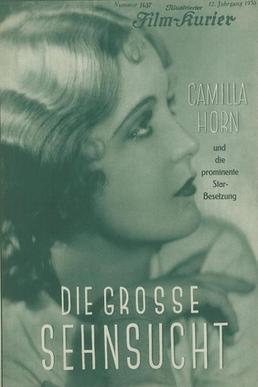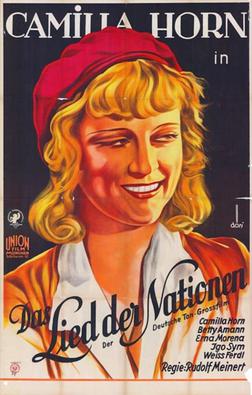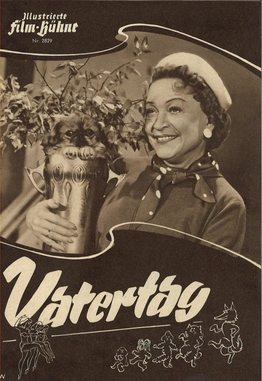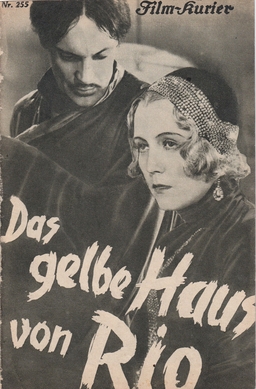
Gustav Diessl was an Austrian artist, and film and stage actor.

The Great Longing is a 1930 German comedy film directed by Steve Sekely in his directorial debut and starring Camilla Horn, Theodor Loos, and Harry Frank. It was shot at the EFA Studios in Berlin. The film's sets were designed by the art directors Hans Sohnle and Otto Erdmann. It was distributed by the German branch of Universal Pictures.

Red Orchids is a 1938 German crime film directed by Nunzio Malasomma, starring Olga Chekhova, Albrecht Schoenhals and Camilla Horn.

My Leopold is a 1931 German comedy film directed by Hans Steinhoff and starring Max Adalbert, Harald Paulsen and Camilla Spira. It is based on Adolphe L'Arronge's 1873 play My Leopold which had previously been adapted into silent films on three occasions. The film's sets were designed by the art director Franz Schroedter.

Anesthesia is a 1929 German silent film directed by Alfred Abel and starring Renée Héribel and Jack Trevor.

A Mother's Love is a 1929 German silent drama film directed by Georg Jacoby and starring Henny Porten, Gustav Diessl, and Paul Henckels. It was shot at the Staaken Studios in Berlin and on location in Pomerania. The film's sets were designed by Gustav A. Knauer and Willy Schiller.

Morals at Midnight is a 1930 German romance film directed by Marc Sorkin and starring Gustav Diessl, Camilla Horn and Vladimir Sokoloff.

Shadows of the Past is a 1936 Austrian drama film directed by Werner Hochbaum and starring Luise Ullrich, Gustav Diessl and Lucie Höflich.

Hans in Every Street is a 1930 German crime film directed by Carl Froelich and starring Hans Albers, Camilla Horn, and Betty Amann. A separate French-language version was also released.

Two People is a 1952 West German historical romantic drama film directed by Paul May and starring Edith Mill, Helmuth Schneider, and Gustav Waldau. It was shot at the Bavaria Studios in Munich and on location around the Dolomites and in Rome. It was based on the 1911 novel of the same title by Richard Voss set in South Tyrol in the late nineteenth century.

Three Days of Fear is a 1952 West German comedy crime film directed by Erich Waschneck and starring Rudolf Platte, Camilla Spira and Cornelia Froboess. It was shot at the Göttingen Studios. The film's sets were designed by Hans Jürgen Kiebach and Gabriel Pellon.

Paths in Twilight is a 1948 West German drama film directed by and starring Gustav Fröhlich. It also features Sonja Ziemann and Benno Sterzenbach. It is part of the rubble film tradition made in Germany in the wake of the Second World War.
Den of Iniquity is a 1925 German silent film directed by Constantin J. David and starring Reinhold Schünzel, Jack Trevor and Maly Delschaft.

Sky Without Stars is a 1955 West German drama film directed by Helmut Käutner and starring Erik Schumann, Eva Kotthaus and Horst Buchholz. It was shot at the Bavaria Studios in Munich. The film's sets were designed by the art director Hans Berthel and Robert Stratil.
You'll Be in My Heart is a 1930 German drama film directed by Max Reichmann and starring Camilla Horn, Fritz Schulz and Victor Varconi.

The Song of the Nations is a 1931 German musical film directed by Rudolf Meinert and starring Camilla Horn, Igo Sym and Betty Amann. A separate French-language version La chanson des nations was also produced.

The Five Accursed Gentlemen is a 1932 French mystery drama film directed by Julien Duvivier and starring Anton Walbrook, Camilla Horn and Jack Trevor. It was made as the German-language version of Moon Over Morocco.
In Thrall to the Claw is a 1921 Austrian silent film directed by Carl Froelich and starring Eugen Jensen, Gustav Diessl, and Julius Strobl. While visiting the set, future director Georg Wilhelm Pabst made his only ever screen appearance as an actor.

Father's Day is a 1955 West German comedy film directed by Hans Richter and starring Grethe Weiser, Paul Westermeier and Camilla Spira. It was shot at the Wandsbek Studios in Hamburg and on location around the city. The film's sets were designed by the art directors Mathias Matthies and Ellen Schmidt.

The Yellow House of Rio or The Yellow House of King-Fu is a 1931 French-German crime thriller film directed by Karl Grune and starring Charlotte Susa, Gustav Diessl and Karl Günther. The film was based on a novel of the same title by Josef M. Velter. It was shot at the Joinville Studios of Pathé in a co-production with Bavaria Film. The film's sets were designed by the art directors Otto Erdmann and Hans Sohnle. Separate German French-language versions were produced, the latter directed by Grune and Robert Péguy and featuring Renée Héribel and Charles Vanel. The German version was originally also planned to be released as The Yellow House of Rio, but to avoid confusion with another film released at the same time Road to Rio, it was retitled.

















